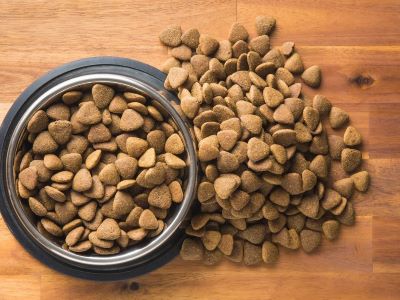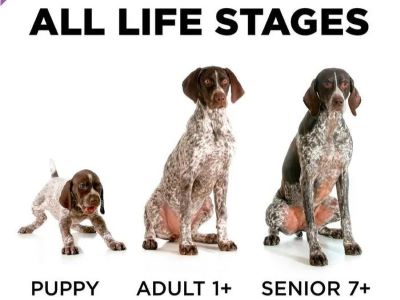As a paw parent, you might have seen your puppy grow and become an adult dog. If you were lucky enough to witness this beautiful cycle of your dog’s growth then you may have faced some struggles too. It’s not just dogs who evolve from puppies, but with them evolves their habits, behaviour, abilities and most of all their food. Every other change can be tackled but the switch in dog’s food needs special attention. You might wonder, Can Adult Dogs Eat Puppy Food?
Puppy food is not suitable for an adult dog, now if you are wondering why then don’t worry. Here in this blog, ‘Can adult dogs eat puppy food?’ we will try to cover every possible aspect of why not to feed puppy food to your dog.

Can Adult Dogs Eat Puppy Food?
No, Adult dogs cannot eat puppy food. Puppies body is different from the adult dog’s body and so is their nutritional requirements. A puppy’s body is rapidly growing and requires more nutrition as compared to dogs.
A puppy’s calorie requirement is higher than a dog’s, and due to this reason, puppy food is calorie-packed. An adult dog’s body does not need that high amount of calories, thus you should avoid feeding your dog puppy food.
As mentioned by Dr. Amanda Ardente DVM in petmd, "You should feed your new family member puppy food until she’s reached about 80% of her anticipated adult size. For small and medium-sized dogs, this is typically when they’re 12 months old. For large- and giant-breed dogs, this could occur between 18-24 months of age. At this point, they should transition to an adult dog food."
Feeding your dogs puppy food can lead to poor overall development and lack of growth in them. Not only this but puppy food can have ill effects on your dog’s health and cause many lifelong diseases.
The Difference Between Puppy Food and Adult Dog Food
Here is the difference between puppy food and adult dog food:

Protein
Protein is an essential source of nutrients for both puppies and adult dogs. It is essential for the growth of hairs and nails of dogs. It helps in building the tissue and organs of dogs and even repairs their muscles.
Though both puppies and dogs need protein, their proportion differs. A puppy’s body requires 22.5 per cent protein, whereas a dog’s body requires somewhat 18 per cent protein.
Due to their rapid growth, the puppies requires more protein as compared to dogs.
Fat
Fat is essential for puppies as well as dogs. Fats like omega-3 and omega-6 help maintain a dog’s coat and promote the development of the immune system and the brain cells.
The fat is easily digestible and keeps dog energetic. However, the fat requirement in puppies and dogs differ. Generally, a puppy requires 8.5 per cent of fat whereas the dog’s fat requirement is 5.5 per cent.
Minerals
Minerals are required by dogs as well as puppies:
- Calcium
- Iron
- Zinc
- Potassium
- Magnesium
- Copper
- Phosphorus
- Sodium
- Iodine
Minerals are essential for dogs and puppies as they fulfil their nutritional requirements[1]. However, puppies require more minerals as their body is rapidly changing. The puppy’s body goes through various phases, either their muscles and bones are building or they are teething.
Due to high mineral requirements, the puppy’s food is also rich in minerals. So if you feed such high-mineral food to your adult dog then it can affect their health adversely.
Kibble size
Even the size of kibble differs in puppy food and dog food. The kibble size of puppy food is smaller, puppies are smaller in size and big-size kibble can get stuck in their throat causing a choking-like situation.
However, there are many adult dogs that require small-size kibbles. Some dog breeds either are small in size or have a small mouth, due to which they require small-size dog food.
The Risks of Feeding Puppy Food to Adult Dogs
Here are some risks of feeding puppy food to your adult dog:

Obesity
Puppy bodies require more energy for their rapidly growing body, and due to this reason, puppy food is rich in calories. Feeding your adult dog such high-calorie food can make him gain weight and lead to obesity.
Obesity is not good for dog’s health. An obese dog becomes less active and fit which further can lead to diseases like diabetes, heart issues, urinary tract infection, arthritis and so on.
Obesity can also be caused by feeding dogs unhealthy human foods like cauliflower. While cauliflower is nutritious for humans, you may wonder – can dogs eat cauliflower?
Joint issues
A puppy’s body requires high minerals for their strong teeth, bones and muscle formation, whereas a dog’s nutritional requirement may not need such a high amount of minerals.
Feeding your adult dog such rich in mineral puppy food can have an adverse effect on their health. Your dog may suffer from arthritis and hip dysplasia which can affect their movement.
Negative impact on pregnant dogs
If your dog is pregnant and you are feeding her the puppy food then it will not only affect her health but will also leave an adverse effect on the health of unborn puppies.
The nutritional needs[2] of pregnant dog is even more different as compared to puppies and adult dog. A pregnant dog has to nurture herself as well as her babies, and a puppy’s food cannot help her fulfil this need.
So if you are giving your pregnant dog puppy food there are higher chances of the unborn puppies suffering from defects.
Feeding your adult dog such high-calorie food can make him gain weight and lead to obesity. There are even some low protein dog food uk options tailored to help obese dogs lose weight safely.
How to Choose the Right Food for Your Adult Dog?
Just providing your dog with food is not important, in order to keep your dog healthy you must provide him with suitable nutritional food. Here are some ways to choose the right food for your adult dog:
- AAFCO is an American organization regulating and setting guidelines for pet food. They indicate the correct nutritional value of your dog’s food, which helps you to choose the right food for your dog. If the food packet indicates “All life stages” then it can be a good choice for your dog.
- Choose the food as per your dog’s preference. While choosing dog food be very particular with your dog’s choice, whether he prefers dry food, wet food, plant-based diet or animal-based diet.
- If you are not able to choose the correct food for your dog by yourself then you can consult a vet. A vet may be able to guide you better about your dog’s nutritional requirements and suggest a better diet.
If your dog has a specific health condition like inflammatory bowel disease (IBD), you may wonder, what to feed a dog with inflammatory bowel disease?
All Life Stage Foods

As of now, it must have been clear how different dog and puppy food are and how differently they serve their respective requirements. But what about ‘All life stage food” what does that mean? And how can it be suitable for both dogs as well as puppies?
Well, “All life stage food” is said to be made in such a way that they fulfil the requirements of puppies to senior dogs. They claim to be suitable diets for all ages of dogs.
It is just that the amount of food your dog will eat is twice the same amount of food a puppy will require. While there are many arguments against “All life stage food” it will be good to consult a vet before you decide to introduce it to your dog’s diet.
FAQs
Is there any difference between puppy and adult dog food?
Yes, puppy food is different from adult food. Puppy foods are generally made according to the puppy’s nutritional needs and dog food is made according to the dog’s nutritional needs. Puppy food and dog food differ in terms of protein, fat and minerals proportion.
Is puppy food easier to digest?
Whether the puppy food is easier to digest or not depends on what it is made of. If the puppy food is made from an animal-based diet then it is easier to digest than the puppy food made from a plant-based diet. The digestibility of puppy food depends upon the ingredients and minerals used in it.
Can adult dogs eat puppy food?
No, adult dogs cannot eat puppy food. Puppy food and adult dog food differ in terms of nutritional requirements. Feeding your adult dog puppy food can lead to a lack of nutrients and minerals in his body and affect its overall growth. Moreover feeding your adult dog a puppy food can give rise to many health-related problems.
When should I switch my puppy to adult food?
The best time to switch your puppy to adult food is once they reach 12 months of age. Generally, a puppy is considered an adult once he reaches 12 months so it is the appropriate time to switch the food. However, there are some breeds that mature before time. Before switching your puppy to adult food always consider consulting a vet.
Can puppy food give my dog diarrhoea?
Yes, puppy food can give your dog a diarrhoea. Puppy food is different in nutritional value, and ingredients may not suit well with your dog’s body. Not only diarrhoea but there are many more health issues that can affect your dog by feeding the puppy food.
Conclusion
Through the blog, “Can adult dogs eat puppy food?” we hope that now you are well aware of the reasons why you should not feed your adult dog puppy food. The purpose of feeding your dog food should be to provide him with all the health benefits.
Feeding your adult dogs, puppy food will serve no good to them but instead will affect their health. Thus to keep your dog healthy choose the correct food for him, You can even consult a vet regarding the same.
Reference:
- Marwat, A. U. K. (2015). YOUR DOG’S NUTRITIONAL NEEDS A Science-Based Guide For Pet Owners. Agriculture-university-peshwar.
- Re-evaluating your dog’s diet. (2023, May 5). Cornell University College of Veterinary Medicine.



